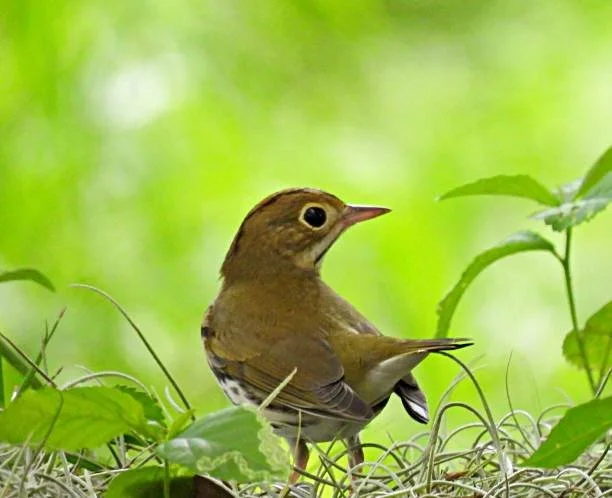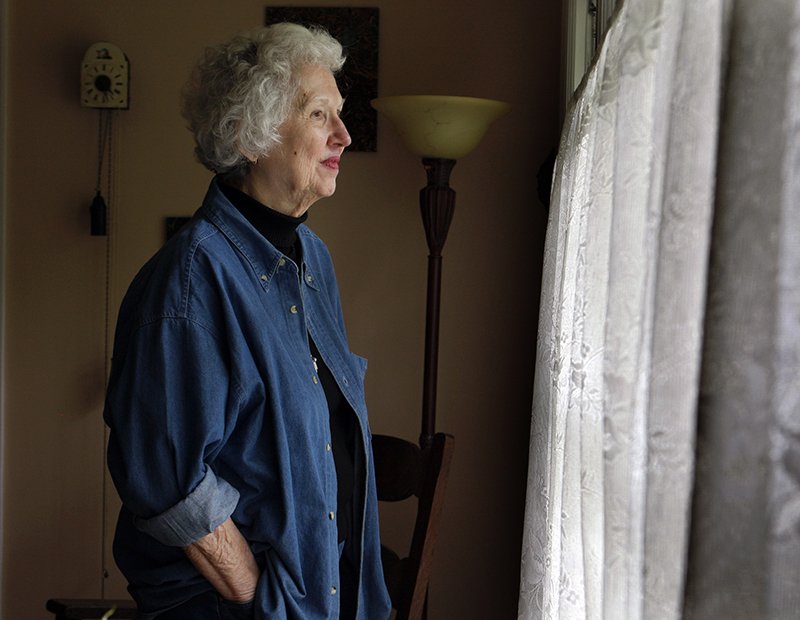Lessons from Birding
Guest Writer: Vickie Becker
Musings from a Campground
Ovenbird
Birding by ear was a concept I’d never heard of before I started hanging around with experienced birders. Whoever thought about being able to identify birds just by listening to them! By the time I wanted to become part of the elite group that could do that, my ears were declining in quality, and I’d long since moved on to hearing aids.
No matter how good or expensive the hearing aids are, it’s not like having young, healthy ears. They just don’t work as well - sound location is tricky, for one thing, and the sound, the tonal quality of birdsong, can get distorted by distance, wind, and reflection. But I try.
There are a few (really loud) birds that I can ID immediately, anywhere, anyplace by sound. Great Horned Owls, for instance. They are immediately recognizable with their nightly “hu-hu-hu-hoo-hoo” calls that reach long distances. Chickadees are pretty identifiable, as are Tufted Titmice, Cardinals with their “Right Chere, Chere, Chere,” Fish Crows denying any culpability, shouting “Nuh-uh.”
There are other species I can recognize with a bit of help. I often use an app called “Merlin .” Merlin will record the birds I’m listening to and tell me what he thinks they are. Merlin tends to know his stuff pretty well and is relatively accurate. I can hear a birdsong and think I know what it is, and Merlin will either agree or disagree. It’s not a bad compromise with poor hearing, I guess.
And there are those birdsongs that are way too high in pitch for me ever to hear, or so fragmented that only a tiny portion of their song is recognizable, or that I hear so infrequently that I just don’t have any idea what I hear, Merlin or no Merlin. It’s complicated. I’m grateful to hear what I can.
I made a trip a couple of hours west to Mount Magazine State Park with a two-fold purpose. The first was to bird. See birds, hear birds, and enjoy birds in all their myriad shapes and sizes. (The second purpose was to ensure the used RV I recently bought was roadworthy for the California trip I planned in a few months. I found a leak in the bathroom, so . . . success after a fashion for my second purpose.)
I found something bird-related I didn’t expect: Ovenbirds were calling incessantly at Mount Magazine.
Ovenbird
Ovenbirds are so named because their nest is said to resemble an outdoor oven. They tend to stay close to the ground and are hard to find in the grass. But you can certainly hear them, even me. The noise was constant. Usually, two birds would sing to each other - a call and a response. This enchanted me because I don’t hear these birds at home. For whatever reason, they were gathering on the top of the highest point in Arkansas, at 2,753 feet, Mount Magazine.
The trees were still bare, at least 3 weeks behind Little Rock.
The wind blew, howled, really, the entire time I was there. Sometimes a gale force, sometimes something lighter, but always wind. The campground was full of tall trees bending in the wind, free of the brush so prevalent in the woods in the central part of the state. And the Ovenbirds sang throughout. If there was daylight, Ovenbirds were singing.
I heard only four species while I was there - the Ovenbirds, a quick comment from an Eastern Phoebe, and American Crows and Blue Jays, which seem to bloom wherever they’re planted.
There were so many birds when I was little that I haven’t seen or heard in years and years. Bob-whites, Whip-poor-wills, and Owls used to be so plentiful.
My dad noticed Scissor-tailed Flycatchers moving north from Texas when I was about ten - ditto for Armadillos and Greater Roadrunners. We didn’t associate it with climate change or habitat degradation at the time. Things change. Losses occur.
But those Ovenbirds sang right straight through. I never saw a single one despite searching for 4 days.
For me, those calls were the substance of things hoped for, the evidence of things not seen. Right there on the top of Mount Magazine.
Vickie Becker
Joanna joannaseibert.com






